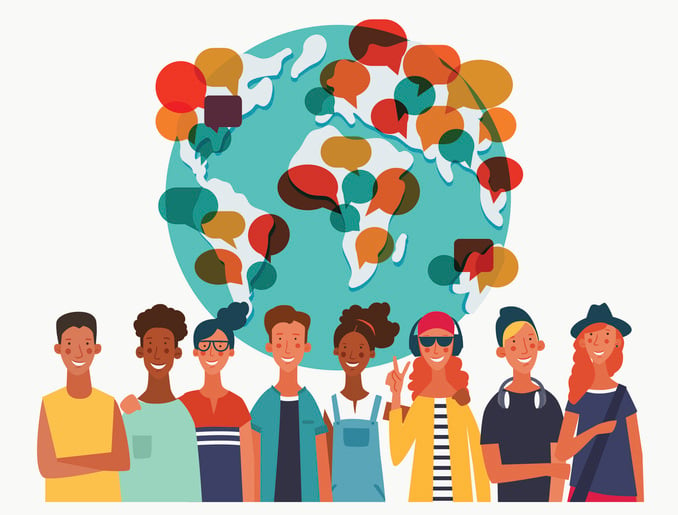
The need for language services is growing around the world as businesses become increasingly global. New opportunities in new markets and the emergence of stronger technology infrastructures are what drives growth across multiple industry sectors.
As a Language Services Provider (LSP), we’re a partner to the businesses we work with. Our clients like to know where we see opportunities to neutralize language barriers as it can help them with their expansion and localization plans.
As we look forward to 2025, here are the top three areas that we anticipate to be growing markets for language services and global trade.
High-Growth Regions for Language Services
Africa
The African Continental Free Trade Area (AfCFTA) aims to enhance trade and economic integration across Africa, creating a single market for goods and services.
This, along with the expanding tech sector and increasing internet penetration, means an increased need for language services in 2025 because of the following factors:
- Increased cross-border trade — As businesses expand into new markets, they require translation and interpretation services to communicate effectively with partners, suppliers, and customers in different countries.
- Diverse languages — Africa is home to thousands of languages and a wide number of trade agreements (either official or by proxy). These foster collaboration among nations with varied linguistic backgrounds, all of whom need to communicate together.
- Legal and regulatory compliance — Companies need to deal with legal documents, contracts, and regulatory requirements, all of which will require accurate translations to ensure compliance with local laws.
- Marketing and advertising — To successfully enter new markets, businesses need culturally appropriate marketing and advertising materials, which require transcreation skills and localization strategies.
- Training and development — Companies may need language services for employee training programs, especially for staff who will engage with international clients or partners.
- Digital communication – E-commerce and online consumer support platforms are on the rise in Africa. This brings with it a growing need for website localization and customer support in multiple languages.
- Conferences and trade fairs - Increased networking opportunities through events are creating a demand for interpretation services to facilitate discussions among people from different cultures and countries.
Asia Pacific (APAC)
The APAC region is seeing increased foreign investment and in some of the traditionally poorer regions of Southeast Asia, a growing middle-class population is involved in businesses that operate across borders.
There is a free trade agreement here too, the Regional Comprehensive Economic Partnership (RCEP), which involves 15 countries that represent about 2.3 billion people or 30% of the world’s population. These developments spur the need for linguistic services for the following reasons:
- Economic growth — The rapid economic development is attracting global businesses and investments. As companies expand, they require language services to communicate effectively with diverse markets.
- Cultural diversity — APAC is home to a multitude of languages and dialects. As cross-border trade and tourism increase, so does the need for translation and localization services.
- Digital transformation — Content needs to be localized for various languages and cultures so that digital communication and e-commerce can reach the wider, and incredibly diverse, APAC audience.
- Education and mobility — Increased international student mobility and educational exchanges drives demand for the translation of academic materials and support for non-native speakers.
- Government and policy changes — Governments may implement policies that require multilingual communication in public services, health care, and legal systems. As policies become live, they need to be accurately translated and implemented with an ongoing language-support infrastructure.
- Technological advancements — The growth of AI and machine translation technologies can facilitate language services. However, it won’t take away the need for human oversight and quality assurance (QA), driving demand for professional linguists.
Eastern Europe and Central Asia
Eastern Europe and Central Asia are becoming more attractive to businesses despite certain areas that are experiencing conflicts and potential governmental destabilization.
In this area IT outsourcing is on the rise and the fintech sector is seeing increased opportunity. Again, there is a strong free trade agreement in place in the form of the Eurasian Economic Union (EAEU).
In this ever-changing environment, getting language right will continue to be a priority in the upcoming year for organizations when looking at:
- Diverse language landscape — The EAEU includes countries like Russia, Kazakhstan, Belarus, Armenia, and Kyrgyzstan, each with distinct languages and dialects. As trade expands, so does the need for the services of a LSP to facilitate communication.
- Regulatory compliance — Companies engaging in cross-border trade must navigate various legal and regulatory frameworks, which requires accurate translations of contracts, compliance documents, and product specifications.
- Marketing and localization — To effectively reach diverse markets, businesses need localized marketing materials, which require skilled translators and transcreators who understand cultural nuances and local consumer behavior.
- Increased business interactions — As trade relations are reviewed around conflicts and changing boundaries, the volume of meetings, negotiations, and collaborations is rising, necessitating professional interpreters to bridge language gaps in real-time.
- Digital transformation — Increased reliance on e-commerce and digital financial platforms is leading to the growth in demand for multilingual customer support and website localization.
- Training and development — Companies need language training services for employees to enhance communication skills and cultural competency in their dealings with partners from EAEU member states.
Exciting Opportunities in 2025
The globalization attitude in these regions provides an exciting backdrop for business in 2025. Many of the factors have their own nuances under the same areas: a rise in technology, economic investment and increased personal wealth, and governments collaborating with each other to increase borderless trade.
If your business can see opportunities in these or any other markets as you look at the year ahead, we’d be more than happy to talk to you about how we can help.
At LinguaLinx, we can help you bring your brand or products to another country, culture or community.
Consultations are free and there’s no obligation. You’re in safe hands with us as we’re ISO 17100 and ISO 9001 compliant, have over twenty years of professional translation experience, and have earned the trust of organizations around the world.






